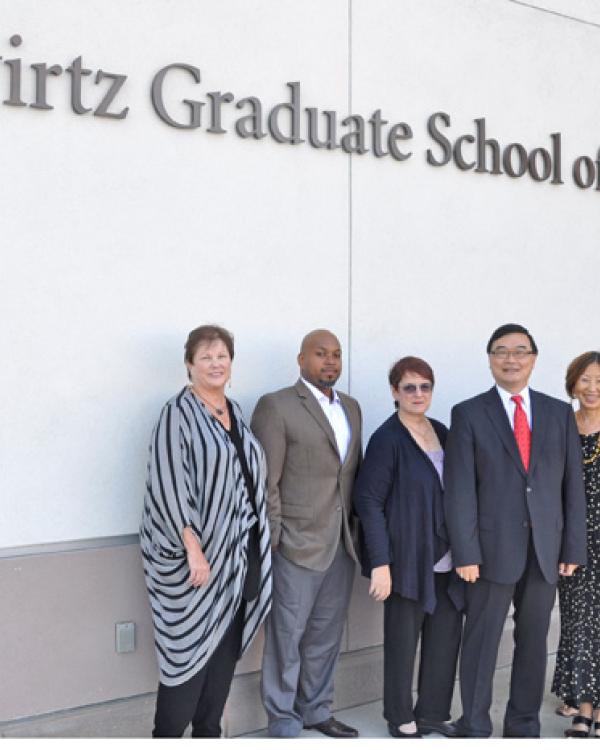
The research team and presenters at the Innovations in Education: Going Global seminar (from l-r): Beth Yeager, Edward Williams III, Judith Green, Stephen Lu, Hsiu-Zu Ho, Kim DeBacco, Kanakara Petrosian
On October 7 a group of education deans in Santa Barbara for a national conference had the additional opportunity to take part in a special seminar presented by UC Santa Barbara's Gevirtz School. Innovation in Education: Going Global examined a new paradigm for online courses, considering the opportunities for international collaboration and research offered by rapidly evolving educational platforms. The event featured Dr. Stephen Lu, Professor of Aerospace and Mechanical Engineering, Computer Science, and Industrial and Systems Engineering at USC, who discussed his creation of the iPodia platform.
"The iPodia model demonstrates our belief that what students learn depends on with whom they learn, that context cannot be taught but is learned by students, and that cultural diversity can inspire global innovation," Lu has said. "With iPodia, USC students are now able to learn from the brightest global classmates, enabling not only a transfer of knowledge but also a mutual understanding across continents."
Dr. Lu's iPodia course "Principles and Practices of Global Innovation," has consisted of 20 students from three universities: USC; Peking University in Beijing, China; National Taiwan University in Taipei, Taiwan. The iPodia program model made it possible — for the first time — for Chinese and Taiwanese students to work directly with each other without crossing the Taiwan Strait. Throughout each semester of the course, iPodia students enjoyed joint classroom instruction, shared coursework, connected through social media, and participated in live discussion through synchronous video conferencing.
Dr. Lu has recently worked with researchers at the Gevirtz School, as he humbly asserted at the event that he's an engineering professor and not an education professor. In particular his work connects with Dr. Judith Green's interests at the Center for Research on Literacy & Inquiry in Networking Communities (LINC), and one of her graduate students, Edward Williams III, who also presented on October 7 and is writing his dissertation evaluating iPodia.
The attractions to the iPodia platform were obvious for Dr. Green, who in 2005-6 spearheaded the similar Thematic School. "We did not want to do traditional distance learning, but something more engaging, with a more participatory level," she relates. Partners at UC Santa Barbara, UC San Diego, The Ohio State University, and Universidad Federal de Minas Gerais, Brazil took part in a eight-day, two-hour a day interactive symposium featuring anthropologist Michael Agar. "We developed new ways of communicating in virtual space," Green says, "that involved making it more fluid, interactive, and responsive. New areas of study came out of the process, new places to think. We built a network of people who have written together, researched together."